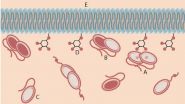Study provides hope for some human stem cell therapies
2015-08-20
(Press-News.org) An international team of scientists headed by biologists at UC San Diego has discovered that an important class of stem cells known as human "induced pluripotent stem cells," or iPSCs, which are derived from an individual's own cells, can be differentiated into various types of functional cells with different fates of immune rejection.
The scientists also found that these cells may not be rejected by the immune system if iPSCs are turned into retinal pigment epithelium cells destined for the eye.
Their discovery provides hope for the development of human stem cell therapies to treat macular degeneration, a major cause of blindness and visual impairment in older adults. An estimated 30 million to 50 million people worldwide are affected by the degenerative medical condition.
The achievement was published in a paper in this week's early online edition of the journal Cell Stem Cell, which will again appear in the September 3 issue of the print journal.
The research effort was headed by Yang Xu, a biology professor at UC San Diego who discovered with colleagues in 2011 that even though iPSCs are derived from an individual's own cells, the abnormal gene expression can cause the immune system to reject certain cells derived from iPSCs.
That could have been a major impediment to the safe use of iPSCs, which are regarded as particularly attractive candidates for stem cell therapies because they can be differentiated into a wide variety of cell types, are not derived from embryonic tissue and are not subject to restrictions that limit the use of human embryonic stem cells.
Funded by a $5.12 million grant from the California Institute for Regenerative Medicine, the state's stem cell agency, Xu and his colleagues at UC San Diego earlier developed "humanized" laboratory mice with a functional human immune system capable of mounting a vigorous immune rejection of foreign cells derived human embryonic stem cells.
"Human and mouse immune systems are quite different," explained Xu, "so we developed a humanized laboratory mouse that carries a functional human immune system. This provides a unique opportunity to evaluate the human immune responses to stem cells."
In their experiments, the researchers developed a variety of cell types from human iPSCs, then tested the immune responses in humanized mice with the immune system of the same individual. They discovered that smooth muscle cells were highly "immunogenic," or strongly rejected by the immune systems of the humanized mice, while retinal pigment epithelial cells were tolerated by the immune system, even when transplanted in parts of the body that provide the environment for robust immune rejection.
The researchers showed that the abnormal expression of immunogenic antigens in smooth muscle cells, but not in retinal pigment epithelium cells, contributes to the differential immunogenicity.
"Immune rejection is a major challenge for stem cell therapy," Xu said. "Our finding of the lack of immune rejection of human iPSC-derived retinal pigment epithelium cells supports the feasibility of using these cells for treating macular degeneration. However, the inflammatory environment associated with macular degeneration could be an additional hurdle to be overcome for the stem cell therapy to be successful."
INFORMATION:
The research team included UC San Diego scientists Tongbiao Zhao, Zhen-ning Zhang, Dilyana Todorova, Meiyan Wang, Jingjin He and Kun Zhang; Peter Westenskow and Martin Friedlander of The Scripps Research Institute and colleagues from Columbia University, UC Santa Barbara, Chinese Academy of Sciences, Southern Medical University, Jilin University, and Guangzhou University of Traditional Chinese Medicine.
The study was funded by grants from the California Institute for Regenerative Medicine, National Eye Institute of the National Institutes of Health (EY11254), Chinese Academy of Sciences, Chinese Ministry of Science and Technology and the National Natural Science Foundation of China.
ELSE PRESS RELEASES FROM THIS DATE:
2015-08-20
A team of Swiss geneticists from the University of Geneva (UNIGE), the École Polytechnique Fédérale de Lausanne (EPFL), and the University of Lausanne (UNIL) discovered that genetic variation has the potential to affect the state of the genome at many, seemingly separated, positions and thus modulate gene activity, much like a conductor directing the performers of a musical ensemble to play in harmony. These unexpected results, published in Cell, reveal the versatility of genome regulation and offer insights into the way it is orchestrated.
Chromatin, a ...
2015-08-20
An international group of researchers led by Carnegie Mellon University physicists Mathias Lösche and Frank Heinrich have established the structure of an important tumor suppressing protein, PTEN. Their findings provide new insights into how the protein regulates cell growth and how mutations in the gene that encodes the protein can lead to cancer. The study is published online in Structure, and will appear in the Oct. 6 issue.
Phosphatase and tensin homolog (PTEN) is a known tumor suppressing protein that is encoded by the PTEN gene. When expressed normally, the ...
2015-08-20
The hippocampus in the brain's temporal lobe is responsible for more than just long-term memory. Researchers have for the first time demonstrated that it is also involved in quick and successful conflict resolution. The team headed by Prof Dr Nikolai Axmacher from the Ruhr-Universität Bochum (RUB), together with colleagues from the University Hospital of Bonn as well as in Aachen and Birmingham, reported in the journal "Current Biology".
Decision conflicts occur often in everyday life
In their everyday life, people are constantly confronted with decision conflicts, ...
2015-08-20
Researchers estimate the 20-year breast cancer-specific death rate for women diagnosed with ductal carcinoma in situ to be 3.3 percent, although the death rate is higher for women diagnosed before age 35 and for black women, according to an article published online by JAMA Oncology.
Ductal carcinoma in situ breast (DCIS) cancer, which is also referred to as stage 0 breast cancer, accounts for about 20 percent of the breast cancers detected through mammography. Some women with DCIS experience a second breast cancer (DCIS or invasive) and a small proportion of patients ...
2015-08-20
People with psychopathic characteristics are less likely to be affected by "contagious yawning" than those who are empathetic, according to a Baylor University psychology study.
Yawning after spotting someone else yawn is associated with empathy and bonding, and "catching" yawns happens with many social mammals, among them humans, chimpanzees and dogs, researchers say.
The study -- "Contagious yawning and psychopathy" -- involved 135 college student respondents and was published online in the journal Personality and Individual Differences.
"You may yawn, even if you ...
2015-08-20
NEW YORK (August 20, 2015) - No single genetic strain of the widespread Clostridium difficile (C. difficile) bacteria appears to be any more harmful than other strains, according to new research published online today in Infection Control & Hospital Epidemiology, the journal of the Society for Healthcare Epidemiology of America.
The findings contradict previous research suggesting that the emergence of the most severe C. difficile infections (CDI) could be linked with a particular strain known as Ribotype 027 (R027). C. difficile is a highly infectious diarrhea that ...
2015-08-20
Bethesda, MD (Aug. 19, 2015) -- Frustrated by a maintenance of certification process that doesn't improve patient care, the American Gastroenterological Association (AGA) this week released a proposed alternate pathway to recertification that is based on established learning theory. 1,3 It eliminates the high-stakes examination and replaces it with active, adaptive, self-directed learning modules that allow for continuous feedback.
AGA shared the proposed pathway with the American Board of Internal Medicine (ABIM), which runs the current maintenance of certification ...
2015-08-20
Working parents often worry about sending their toddlers to daycare. But the results of a new study that tracked almost 1,000 Norwegian children enrolled in daycare indicate that working parents can breathe a sigh of relief: The amount of time children spent in daycare had little impact on aggressive behavior.
The study is published in Psychological Science, a journal of the Association for Psychological Science.
"From a public perspective, our findings are important because they should help ease parents' fears about the potential harms of early non-parental child care," ...
2015-08-20
Tropical Storm Danny became the fourth named storm of the season on August 18 when it formed in the central Atlantic about 1,660 miles east of the Windward Islands. The Global Precipitation Measurement (GPM) mission core satellite passed over Danny the next day and analyzed the structure of its rainfall.
Danny originated from an African easterly wave that moved off of the coast of Africa 4 days earlier on the 14th of August. Storms that form in this region are known as Cape Verde storms and typically form towards the height of hurricane season.
In a typical season, ...
2015-08-20
TORONTO, ON, August 20, 2015 - Women diagnosed with ductal carcinoma in situ (DCIS) are twice as likely to die from breast cancer compared to the general U.S. population, according to a new study led by Dr. Steven Narod.
"Our work shows that DCIS has more in common with small invasive cancers than previously thought," explains Dr. Narod, a scientist with Women's College Research Institute and a professor with the Dalla Lana School of Public Health at the University of Toronto. "In these cases, we've found that there's an inherent potential for DCIS to spread to other ...
LAST 30 PRESS RELEASES:
[Press-News.org] Study provides hope for some human stem cell therapies

